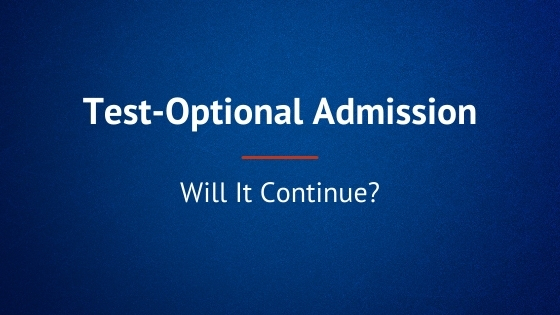As the Coronavirus pandemic overtook the US last year, the SAT and ACT faced repeated cancellations, and colleges and universities responded in an unprecedented way: by overwhelmingly going test-optional for their admissions decisions. We covered this last year, but now we want to look at this subject again, as lockdowns wind down and normal life resumes.
The full impacts of a round of test-optional admissions, and what it may mean for students going forward are still developing, but there are already crucial changes. Many colleges which were test-optional last year have extended this policy through 2022. In this article, we’ll explore the impacts of test-optional admissions, and how colleges, students, and others have responded.
What is the Impact of Test-Optional Admissions?
We’ve discussed the 2020 admissions cycle previously because as with everything else that happened in 2020, it was somewhat irregular. The fact that almost every college and university in the country went test-optional for admissions only contributed to this fact.
The largest impact from this change was a jump in application numbers, though some of that increase may have also been due to students putting off beginning college in 2020. Even so, many more students applied to college in 2020 than ever before, with most of this growth coming from students applying to top schools. Many elite schools saw application numbers grow by 10% or more, an unprecedentedly large surge.
Students who applied without test scores were generally less likely to be accepted to top colleges than students who applied with great test scores. While not having test scores didn’t actively hurt applicants, students with high test scores were still aided by their inclusion. While this effect was more notable in some schools than others, the trend can be seen across the board.
This is interesting in part due to which students were more likely to apply test-optional. First-generation, fee-waiver, and underrepresented students were far more likely to take advantage of the new test-optional policies than their more well-off peers.
Further studies suggest that while test-optional policies do benefit some students, they may not be the great equalizer for admissions that some advocates were hoping for. More time will show whether or not this is a fluke; a single admissions cycle is not enough to draw firm conclusions.
It is important to note this only applies to the schools which went test-optional. Scholls which decided to go test-blind (menaing no test scores were considered in admissions at all) did not see a corresponding gap in admissions numbers.
Responses to Test-Optional Policies
Schools have had a wide array of responses to test-optional policies. The overarching trend, however, has been steep growth in the popularity of this policy overall. The ACT admitted as much recently, saying that standardized test policies have been permanently shifted due to the pandemic. While they are confident that testing will remain a vital part of the admissions process, they believe that test-optional policies are here to stay.
The government has also gotten involved in the test-optional debate. While the UC system led the way, Illinois recently passed a law requiring all state and community colleges within Illinois to be test-optional from January 1st 2022 onward. They are the second state to do so this year, joining Colorado. While it remains to be seen whether this will become a national trend, test-optional advocates are relishing this progress.
Students have relished test-optional policies, with many viewing the new options as a great boon. While this may not match the reality, this new belief has lifted much stress from students when it comes to completing standardized tests, and applying to colleges generally. Due to the enormous amount of stress students are under generally, we view this as a positive development.
What This Means For You
While the future is always uncertain, it does appear that the importance of standardized testing is on the decline. This is unequivocally good news for students, but does change how you should approach both testing and admissions.
While there may be less pressure on you to get a good score, that does not mean testing is worthless now; indeed, a good score on standardized tests will substantially boost your chances of admission to top schools. This means that you should still try your hardest to do well on these tests.
The testing companies are, of course, eager to forestall their slide into irrelevance. While there is not yet overwhelming support for eliminating testing entirely, the current movement is definitely worrying for them. It is unclear how they will react going forward, but it is possible changes to the tests will be unveiled in the next few years. This will likely not affect any current juniors or seniors but is something to watch for on the horizon.
There will likely be a disconnect in the approaches of public and private colleges. While some states have passed legislation regulating the use of standardized tests by public schools, there is not yet a movement for such regulation of private schools. Any such regulation would have to come from the federal level as well and is out of the hands of individual states.
For students applying to college this year, we do still recommend taking standardized tests and trying to do well. While doing poorly will not hurt you, doing well can greatly help you. There is some evidence that colleges favor students who submit test scores, but that does not mean students who do not submit scores can’t get in.
If your grades and activities were not enough to get you into a top college before, merely being able to submit an application without test scores will not improve your chances. It will only help if your grades are high and activities are impressive, but your low test scores bring down the overall quality of your application.
Final Thoughts
The future of standardized testing is in question, but for now, at least, there is still value in taking and doing well on these tests, even if they are lower stress. While test scores are not the only aspect of your application colleges care about, they are an easy metric by which students can be compared.
If you would like our help on your test prep journey or have questions about what we can offer you, we encourage you to reach out. Please schedule a free strategy session with our head of test prep, Alex Nelson. Having scored a perfect 1600 himself in high school, and with over 10,000 hours of SAT and ACT teaching under his belt, Alex has the experience necessary to put you on the path to SAT success.








